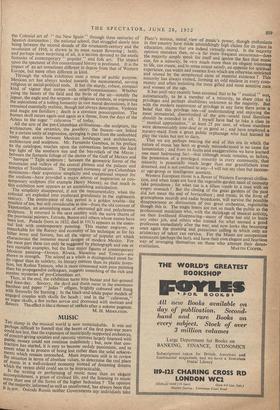MUSIC
THE slump in the musical world is now unmistakable. It was not Perhaps difficult to foretell that the boom of the first post-war years could not last, that the expansion of municipally-supported orchestras, of concert-giving societies and operatic ventures largely financed with Public money could not continue indefinitely ; but, now that con- traction has started, it is easy to become unduly pessimistic, and to count what is in process of being lost rather than the, solid achieve- ments which remain untouched. More important still is to review the situation in terms of absolute values, to determine the real place of music in a well-ordered economy instead of dreaming dreams Which the veriest child could see to be impracticable.
Is the writing or performing of music more than an elegant accomplishment, a grace of civilised life, and the listening to music more than one of the forms of the higher hedonism ? The opinion of the majority, informed as well as uninformed, has always been that it is not. Outside Russia neither Governments nor individuals take
Plato's serious, moral_ view of music's power, though enthusiasts in this country have made astonishingly high claims for its place in education, claims that are indeed virtually moral. Is the majority opinion mistaken then, or—a far more frequent occurrence—does the majority simply speak for itself and ignore the fact that music can, for a minority, be very much more than an elegant trimming to life, can create, and to some extent satisfy, an appetite for spiritual experience, can widen and sweeten lives which are otherwise restricted and soured by the sempiternal cares of material existence 7 This minority has always existed, forming an odd enclave in every com- munity and often including the most gifted and most sensitive men and women of the age.
It has until very recently been assumed that to be musical " was, automatically, to be a member of a minority, to share (that is) privileges and perhaps disabilities unknown to the majority. But with the modern resentment of privilege in any form there arose a belief that this privilege too—of understanding and enjoying the most immaterial, disembodied of the arts—could (and therefore should) be extended to all. I myself have had to take a class in " musical appreciation," at least 25 per cent. of whose members were demonstrably tone-deaf or as good as ; and have employed a nursery-maid from a great public orphanage who had learned to play the violin but not to darn.
That we are perhaps nearing the end of this era in which the nature of music has been so grossly misunderstood is no cause for lamentation ; and from its faults and exaggerations we have learned one most heartening fact—that although music remains, as before, the possession of a privileged minority in every community, that minority is potentially much larger than our grandfathers ever dreamed, and is not confined to any—I will not say class but income-
or age-group or intelligence quotient. .
Western European music is a flower of Western European civilises tion, and when times are hard the vegetable-garden must of necessity take precedence ; for what use is a Own regale to a man with an empty stomach ? But the closing of the great gardens of the past did not mean the end of horticulture ; and music, in the form of gramophone records and radio broadcasts, will survive the possible disappearance or diminution of our great orchestras, regrettable though this is. The tragic losers are not so much the public as the professional musicians who, with the shrinkage of musical activity, see their livelihood disappearing—many of them too old to learn any other job, and others who trained for what seemed a good profession immediately after the war, and now looks like becoming once again the straining and precarious calling in which only an aristocracy of talent can survive. For the Muses are unrepentant aristocrats (perhaps the last), and have their own elegant and heartless way of revenging themselves on those who attempt their demo- cratisation. MARTIN COOPER.


















































 Previous page
Previous page